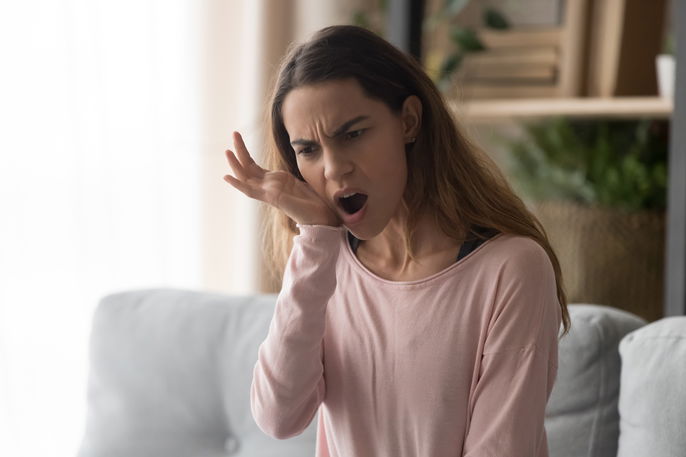Jaw popping usually occurs due to a dysfunction of the temporomandibular joints, which are responsible for connecting the jaw to the skull, and allow you to speak, chew and yawn.
Jaw popping is most likely to occur in people who frequently chew gum, bite their nails, clench their jaw o bite their lip or cheek, as these habits can cause wear and tear on the joint.
However, jaw popping can be caused by more serious conditions, such as bruxism, arthritis or an oral infection, for example. Therefore, if your jaw popping also causes intense pain, you should consult an orthopedic surgeon, dentist or family doctor, you should seek medical assessment.

Why does my jaw pop?
The main causes of jaw popping are:
1. Bruxism
Bruxism is characterized by the unconscious act of clenching or grinding your teeth during sleep or even in everyday life. This can happen due to stress, anxiety, use of some antidepressant medications and respiratory problems, like snoring or sleep apnea.
When teeth are constantly being clenched, it is common for there to be pain in the jaw joint, which can also pop. Damage to the teeth can also be noted.
What to do: Bruxism is not curable, however, it is possible to relieve the pressure exerted on the jaw joint and prevent tooth damage by using a mouth guard at night, as prescribed by a doctor. Serious cases of bruxism may require further treatment with a short course of muscle relaxants and anxiolytics.
2. Arthritis
Arthritis is a joint disease that can damage to the cartilage of the temporomandibular joint. This loss of cartilage can prevent jaw movements from being carried out correctly, resulting in popping noises.
What to do: In this case, it is important to see your doctor for testing to determine whether there is arthritis present in the joint. If confirmed, the doctor can prescribe treatment such as medication, physiotherapy and, in more serious cases, surgery.
Also recommended: Arthritis Diet : What to Eat & Avoid (with 3-Day Meal Plan) tuasaude.com/en/arthritis-diet3. Jaw injuries
A jaw injury from a direct blow,, a car accident or a fall, for example, can cause jaw bones to break or become dislocated. This can cause popping noises, as well as other symptoms like swelling, bleeding, numbness and pain at the site of the injury.
What to do: Treatment for jaw injuries will vary depending on the type of injury that occurred. The doctor may advise immobilization, or surgery ofr cases in which the jaw needs to be reconstructed, repositioned or fixed.
4. Dental malocclusion
Dental malocclusion is characterized by an abnormality in how the upper teeth meet the bottom teeth when the mouth is closed. This can lead to damage to the teeth, gums, bones, muscles and TMJ.
What to do: Generally, treatment consists of the use of braces or retainers to align the teeth. In more serious cases, when braces have not been, surgery may be necessary to change the shape of the facial bones.
5. Infection
Salivary gland infections can also cause temporomandibular joint dysfunction, as well as jaw pain and popping. Other symptoms associated with infections include difficulty opening the mouth, presence of pus in the mouth, pain in the area, a foul taste in the mouth and swelling of the face and neck .
What to do: It is important to consult a dentist so that the infection can be diagnosed and treated. Treatment may involve the use of antibiotics (for bacterial infections) and/or analgesic or anti-inflammatory medications.
6. Cancer
Although it is very rare, jaw popping can be a sign of cancer in areas of the mouth, such as the lips, tongue, cheek, gums or surrounding areas, as the presence of these types of tumors can interfere with jaw movement.
Generally, when the cause of the clicking jaw is related to cancer, other symptoms may be present, such as swelling in the area, loss of teeth, difficulty wearing dentures, a growing mass in the mouth, swelling in the neck and notable weight loss.
What to do: It is essential to consult a doctor for testing and treatment if confirmed. Treatment may vary according to the location of the tumor and its extent, any may involve surgery, chemotherapy and/or radiation therapy.






























